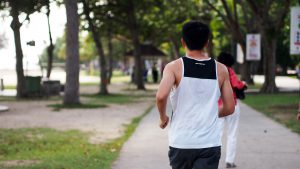“I have HIV but I’m not the HIV” – the experiences of heterosexual Chinese men living with HIV in Singapore
March 28, 2022

Ms Lai Peng Priscilla Ho (Principal Medical Social Worker, Tan Tock Seng Hospital) and Associate Professor Esther Goh (NUS Department of Social Work) explore the everyday lives of twelve heterosexual Chinese men living with the disease and how it impacts their self-identity in ‘I have HIV but I’m not the HIV – the experiences of heterosexual Chinese men living with HIV in Singapore’ (AIDS Care, 2020).
Singapore has a relatively low prevalence of HIV (human immunodeficiency virus) in the population, with Ministry of Health (MOH) statistics indicating that that there were just under 8,000 cases by the end of 2017. The same statistics show that new infection rates stand at 50% for homosexual transmission and 35% for heterosexual transmission; sexual intercourse is almost exclusively the main mode of HIV transmission, standing at 96%.
The study participants were selected from the largest medical treatment facility for people living with HIV in Singapore. All the interviews lasted approximately 90 minutes and were conducted in English or Mandarin; the participants were given a US$65 participation fee for their cooperation.
The findings revealed that secrecy and attempting to continue to live a normal life was the most important aspect within the responses. Most of the participants felt that living normally was dependent upon keeping their diagnosis a secret, and despite significant advances in HIV treatment and care, public awareness often lagged behind these developments and stigma was both a presumed and real ongoing fear if their colleagues or friends ever learnt of their diagnosis.
The men in the study would not allow HIV to define their entire character, and Ms Ho and A/P Goh provide the analysis that the participants countered the threat of the stigmatizing condition by focusing on their normative identities (what someone considers to be the core identity). These men chose to be seen as a father, husband, or son rather than as a HIV-patient, re-affirming Singapore’s strong societal and state emphasis on the family.
Read the full article here.
